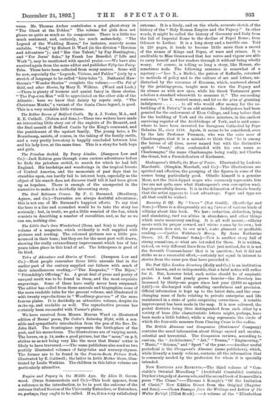Empire and Papacy in the Middle Ages. By Alice D.
Green- wood. (Swan Sonnenschein and Co.)—This book appears, from a reference in the introduction, to be in part the outcome of the autumn Oxford Session of the University Extenders, or Extendees, as, perhaps, they ought to be called. If so, it is a very satisfactory outcome. It is a lively, and on the whole, accurate sketch of the history of the " Holy Roman Empire and the Papacy." In other words, it might be called the history of Germany and Italy from the fall of Imperial Rome to the decline of Papal Rome ; from Odoacer to Luther. It is a long story and a terrible one. Told in 220 pages, it tends to become little more than a record of the names of Kings and Popes, of wars and crimes. It is creditable to Miss Greenwood that her verve and vigour are able to carry herself and her readers through it without being wholly weary. Of course, in telling so long a story, like Homer, she sometimes nods. The following sentence is somewhat of a mystery :—" Leo X., a Medici, the patron of Raffaelle, returned to methods of policy and to the culture of art and letters, un- disturbed by the sarcasms of Erasmus, which, scattered abroad by the printing-press, taught men to view the Papacy and its abuses as with new eyes, while his Greek Testament gave scholars a standard wherewith to measure it." The succeeding sentence, "Leo X. wanted money, and hit on the plan of granting indulgences to all who would offer money for the re- building of S. Peter's," is an odd mistake. Indulgences had been granted for the endowment of Eton College, and long before that for the building of York and its sister minsters, in the earliest surviving register of the Archbishops of York, and is said some- where to have been invented for Saragossa Cathedral by Pope Gela,sius II., circa 1118. Again, it seems to be considered, even by the late Professor Freeman, who was the vales sacer of Charlemagne, that it is a mistake to think that "he is among the heroes of all time, never named but with the distinctive epithet 'Great,' often confounded with his own name as Charlemagne," the name Charlemagne being really, not Charles the Great, but a Frenchification of Karlmann.


































 Previous page
Previous page